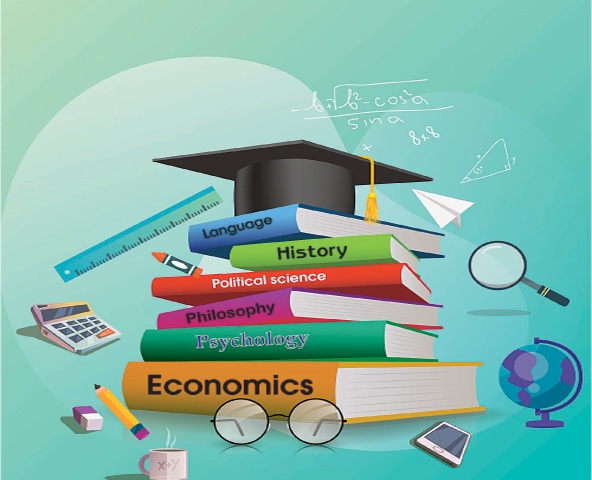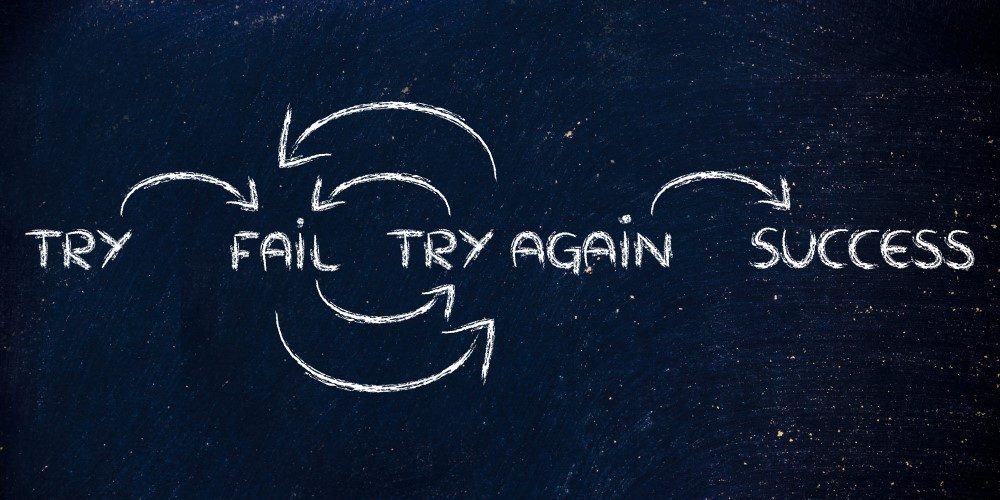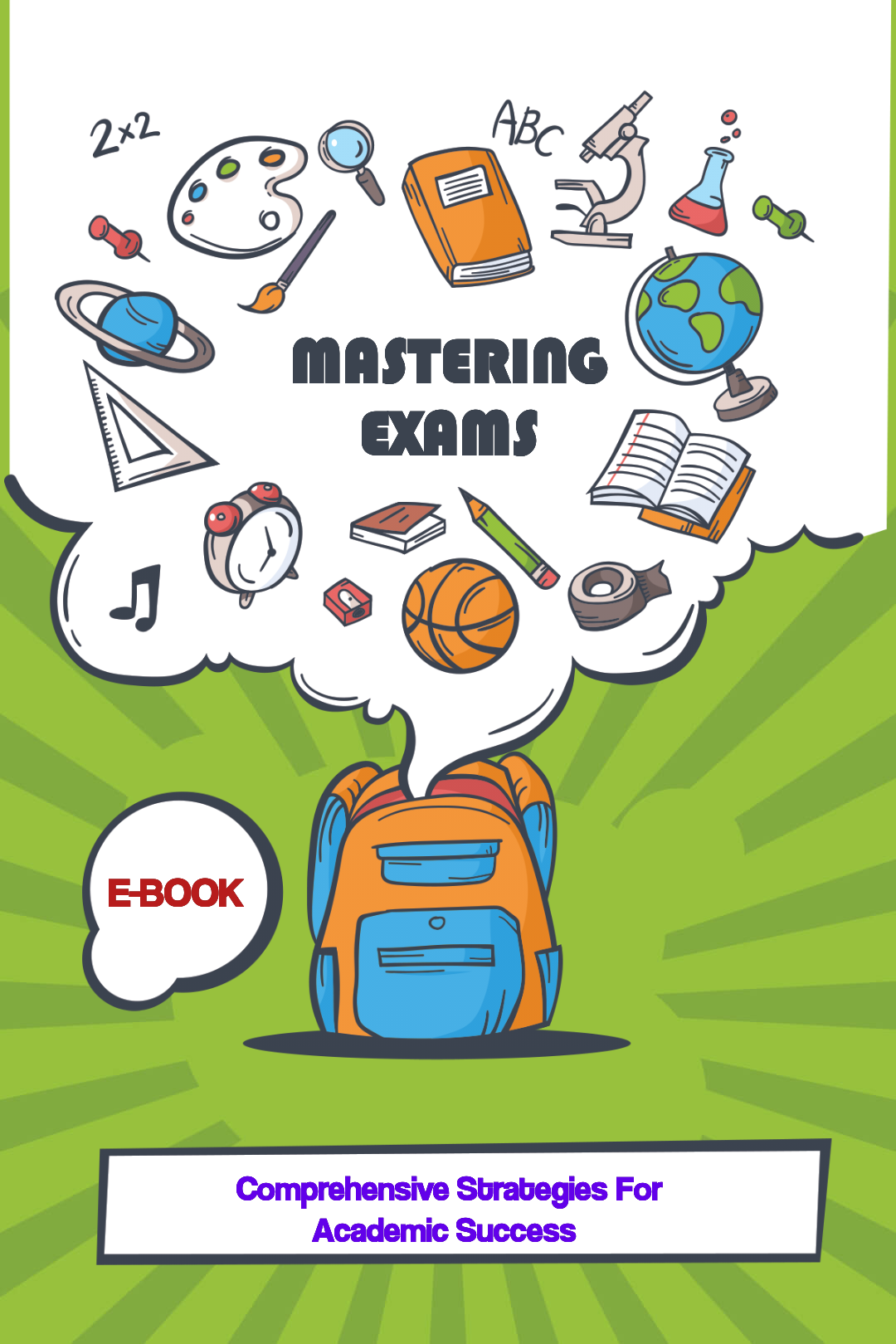Preface
Dear Readers,
Welcome to "Mastering Exams: Comprehensive Strategies for Academic Success." This book is born from the belief that effective exam preparation is not just about achieving high marks; it's about fostering a deeper understanding of subjects and cultivating lifelong learning habits.
In today's educational landscape, the pursuit of academic excellence requires more than just memorization. It demands a multifaceted approach that encompasses effective study techniques, time management skills, and subject-specific strategies. This book aims to be your guiding light in navigating these complexities.
As a student, teacher, or academic enthusiast, you understand the challenges that come with preparing for exams. This book is crafted to provide comprehensive guidance tailored to your needs, offering insights, techniques, and practical advice to help you not just succeed in exams but thrive in your academic pursuits.
Each chapter is meticulously designed to address various aspects of exam preparation. From understanding different exam formats to subject-specific strategies, note-taking techniques, and ways to manage exam stress, this book covers a spectrum of topics aimed at enriching your preparation.
Moreover, our goal isn't just confined to exam success. We aspire to instill a mindset of continuous improvement and lifelong learning. Beyond the pages dedicated to exam preparation techniques, you'll find strategies to embrace challenges, develop critical thinking skills, and create a supportive learning environment.
"Mastering Exams" isn't just a book—it's a companion on your academic journey. Whether you're a student striving for top grades, a teacher guiding students toward success, or an individual passionate about continual learning, this book is crafted for you.
We hope the strategies and insights shared within these pages become invaluable tools in your pursuit of academic excellence. Let this book be the catalyst that propels you toward your goals and empowers you to excel not just in exams but in your ongoing quest for knowledge.
Sincerely,
Mukesh Sharma
Contents
Chapter 1: Introduction to Effective Exam Preparation
- Overview of the importance of exam preparation
- Understanding different exam formats and requirements
- Setting goals and creating a study plan
Chapter 2: Study Techniques and Time Management
- Effective study habits and techniques for different learning styles
- Time management strategies for optimal study sessions
- Balancing study time for multiple subjects
Chapter 3: Subject-Specific Strategies
- Mathematics: Problem-solving techniques, formulas, and practice exercises
- Language Arts: Reading comprehension, essay writing, grammar tips
- Sciences: Study methods for biology, chemistry, physics, and practical experiments
- Humanities: History, geography, and social sciences study approaches
Chapter 4: Note-Taking and Revision Methods
- Importance of effective note-taking during classes and self-study
- Different methods for organizing and reviewing notes
- Creating summary sheets and flashcards for quick revision
Chapter 5: Exam Preparation Techniques
- Preparing for different types of exams (multiple choice, essays, practical exams)
- Tips for managing exam stress and anxiety
- Strategies for last-minute revision and staying calm during exams
Chapter 6: Practice Tests and Mock Exams
- The importance of practice tests in exam preparation
- How to create and utilize mock exams effectively
- Analyzing and learning from mistakes in practice exams
Chapter 7: Resources and Tools for Exam Preparation
- Utilizing technology for studying (online resources, educational apps)
- Library resources, study groups, and tutoring services
- Recommended books, websites, and study materials for each subject
Chapter 8: Strategies for Success Beyond Exams
- Applying effective study habits to long-term learning
- Developing critical thinking and problem-solving skills
- Setting academic goals and continuous improvement
Chapter 1: Introduction to Effective Exam Preparation
Welcome to "Mastering Exams: Comprehensive Strategies for Academic Success." The journey to academic excellence begins with effective exam preparation. Whether you're a student aiming for top grades or a teacher guiding your students toward success, this book is your comprehensive guide.
Exams are a significant part of academic life, testing not just your knowledge but also your ability to apply what you've learned. Understanding the importance of preparation is the first step toward mastering exams. In this chapter, we'll explore the fundamental principles of successful exam preparation.
The Significance of Preparation

Effective preparation is the cornerstone of success in exams. It's not merely about rote memorization but understanding concepts, developing critical thinking, and honing problem-solving skills. This book aims to equip you with the tools and strategies necessary to excel in various subjects.
Understanding Exam Formats
Exams come in various formats—multiple choice, essays, practical tests, and more. Each format requires a distinct approach. Knowing what to expect from different types of exams is essential to tailor your preparation effectively.

Setting Goals and Creating a Study Plan

Goal-setting is crucial in guiding your preparation. Whether it's achieving a certain grade or mastering specific subjects, setting clear and achievable goals helps structure your study plan. We'll discuss how to create a study plan that aligns with your objectives.
Who Can Benefit from This Book?
This book is designed for students seeking academic excellence, teachers aiming to support their students in achieving high marks, and anyone looking to enhance their exam preparation strategies across various subjects.

As you delve deeper into this book, you'll discover subject-specific strategies, effective study techniques, time management skills, and invaluable tips to succeed in exams.
Remember, preparation is the key to success. Let's embark on this journey together to master exams and achieve academic excellence.
Chapter 2: Study Techniques and Time Management
Welcome to the chapter dedicated to honing your study techniques and mastering time management. Successful exam preparation isn't just about putting in the hours; it's about how effectively you use that time. In this chapter, we'll explore various study techniques and strategies for managing your study time efficiently.
Effective Study Habits

Everyone has a unique learning style. Understanding how you learn best—be it through visual aids, auditory methods, or hands-on experiences—is crucial. We'll delve into different study habits and techniques tailored to different learning styles to help you maximize your study sessions.
Time Management Strategies
Time is a precious resource, especially during exam preparation. We'll discuss strategies to optimize your study time, such as the Pomodoro Technique, time-blocking, and prioritizing tasks. Learning to manage your time effectively can significantly improve your productivity and reduce stress.

Balancing Multiple Subjects

Students often juggle multiple subjects, each with its own set of demands. We'll explore strategies to balance your study time across various subjects, ensuring you give adequate attention to each without feeling overwhelmed.
Tailoring Techniques to Subjects
Different subjects might require different study approaches. For instance, mathematics might need more problem-solving practice, while languages might focus on reading comprehension and writing skills. We'll discuss how to tailor your study techniques to suit the specific requirements of each subject.

Continuous Improvement

Finally, we'll touch on the importance of continuous improvement in your study techniques and time management. Learning what works best for you is an ongoing process, and being open to refining your methods can significantly enhance your preparation.
Mastering study techniques and managing time effectively are key pillars in achieving success in exams. Let's explore these strategies together to elevate your exam preparation to new heights.
Chapter 3: Subject-Specific Strategies
Welcome to the realm of subject-specific strategies. Each subject presents its own challenges and requires tailored approaches to excel. In this chapter, we'll delve into strategies for various subjects, equipping you with the tools needed to conquer each academic arena.
Mathematics: Problem-Solving Techniques and Practice

Mathematics often poses challenges due to its problem-solving nature. We'll explore effective techniques for solving mathematical problems, mastering formulas, and the importance of regular practice to solidify your understanding.
Language Arts: Reading Comprehension, Writing Skills, and Grammar
Language arts encompass a wide spectrum, from reading comprehension to writing skills and grammar. We'll discuss strategies to improve reading comprehension, enhance writing abilities, and polish grammar to excel in language-related exams.

Sciences: Biology, Chemistry, Physics, and Practical Experiments

Sciences demand not just theoretical knowledge but also an understanding of practical applications. We'll explore study methods for biology, chemistry, physics, and how to approach practical experiments to ace science-based exams.
Humanities: History, Geography, and Social Sciences
Humanities subjects often involve understanding historical events, geographical concepts, and societal structures. We'll discuss effective study approaches tailored to history, geography, and social sciences, helping you navigate these subjects with ease.

Each subject demands a unique set of skills and approaches. By understanding the specific requirements of each subject and employing targeted strategies, you'll be better equipped to tackle exams across the academic spectrum.
Chapter 4: Note-Taking and Revision Methods
Welcome to the chapter focused on effective note-taking and revision strategies. Your notes are a roadmap to understanding and retaining information, while revision ensures that knowledge is firmly embedded. In this chapter, we'll explore techniques to optimize note-taking and revision methods for maximum retention.
The Importance of Effective Note-Taking

Taking good notes during lectures or while studying is essential for understanding complex topics. We'll discuss different note-taking methods such as the Cornell Method, mind mapping, and outlining, helping you capture and organize information effectively.
Organizing and Reviewing Notes
Creating organized and structured notes is only part of the process; regular reviewing is crucial. We'll explore strategies to keep your notes organized and how to review them systematically to reinforce learning and retain information for exams.

Creating Summary Sheets and Flashcards

Condensing information into summary sheets or flashcards can aid in quick and efficient revision. We'll discuss how to create these study aids and utilize them effectively to reinforce key concepts before exams.
Adapting Note-Taking and Revision to Subjects
Different subjects may require different note-taking and revision approaches. We'll explore how to adapt these techniques to suit the requirements of various subjects, ensuring your study materials are tailored for each discipline.

Integrating Note-Taking and Revision into Study Plans

Lastly, we'll discuss how to incorporate effective note-taking and revision practices into your overall study plan. These techniques should seamlessly integrate into your routine to maximize their effectiveness.
Mastering the art of note-taking and revision is pivotal in retaining information and preparing for exams. Let's explore these techniques together to enhance your study arsenal.
Chapter 5: Exam Preparation Techniques
Welcome to the chapter dedicated to exam preparation techniques. Preparing for exams involves more than just studying—it requires strategic planning, stress management, and specific strategies tailored to different exam formats. In this chapter, we'll explore various techniques to ensure you're fully prepared when the exam day arrives.
Understanding Different Exam Formats

Different exams require different approaches. We'll delve into strategies for multiple-choice exams, essay-based assessments, practical tests, and how to adapt your preparation for each format.
Managing Exam Stress and Anxiety
Exam stress is a common challenge. We'll discuss strategies to manage stress and anxiety effectively, including relaxation techniques, mindfulness practices, and maintaining a healthy mindset during exam periods.

Last-Minute Revision Strategies

As exams approach, effective last-minute revision can make a significant difference. We'll explore how to condense information, prioritize topics, and execute efficient revision sessions in the final days before exams.
Time Management During Exams
Time management during exams is crucial. We'll discuss strategies to allocate time wisely, tackle questions efficiently, and ensure you complete the exam within the given timeframe.

Staying Calm and Focused During Exams
Maintaining focus and composure during exams is key to performing your best. We'll explore techniques to stay calm under pressure and maintain concentration throughout the exam.
Preparing for exams involves a multifaceted approach that goes beyond just studying the material. Let's explore these exam preparation techniques together to ensure you're fully equipped to excel on exam day.
Chapter 6: Practice Tests and Mock Exams
Welcome to the chapter dedicated to the significance of practice tests and mock exams in exam preparation. Practice makes perfect, and in this chapter, we'll explore how regular testing and simulated exam conditions can significantly enhance your readiness for the real thing.
Importance of Practice Tests

Practice tests are invaluable tools for gauging your understanding of the material. We'll discuss why incorporating regular practice tests into your study routine is essential and how they help identify areas that need further improvement.
Creating and Utilizing Mock Exams

Mock exams simulate real exam conditions and are vital in preparing you for the actual test environment. We'll explore how to create mock exams, the importance of timing and conditions, and how to effectively analyze your performance afterward.
Learning from Practice Test Mistakes
Making mistakes in practice tests isn't a setback—it's an opportunity to learn. We'll discuss how to analyze and understand your mistakes, ensuring that you not only correct them but also learn from them to avoid similar errors in the actual exam.

Tracking Progress Through Practice Tests

Tracking your progress through regular practice tests is crucial. We'll explore methods for monitoring your improvement, setting benchmarks, and adjusting your study plan based on your performance in these tests.
Integrating Practice Tests into Study Plans

Lastly, we'll discuss how to integrate practice tests and mock exams seamlessly into your study schedule. These tests should complement your learning process and aid in reinforcing your knowledge.
Practice tests and mock exams serve as essential checkpoints in your exam preparation journey. Let's explore how to harness their power to enhance your readiness for the real exam.
Chapter 7: Resources and Tools for Exam Preparation
Welcome to the chapter dedicated to various resources and tools that can elevate your exam preparation. In today's digital age, numerous resources and aids are available to enhance studying. In this chapter, we'll explore different avenues and tools that can complement your preparation.
Utilizing Technology for Studying

Technology offers a wealth of resources for learning. We'll explore online platforms, educational apps, and digital tools tailored to aid in studying, revising, and practicing different subjects.
Leveraging Library Resources
Libraries remain a treasure trove of knowledge. We'll discuss how to effectively utilize library resources, including books, journals, and academic databases, to enhance your understanding of subjects.

Study Groups and Tutoring Services

Collaborative learning can be highly beneficial. We'll explore the advantages of study groups, tutoring services, and peer-to-peer learning, enabling you to leverage collective knowledge and support.
Recommended Books, Websites, and Study Materials
Certain books, websites, and study materials stand out for their quality and relevance. We'll provide recommendations for resources specific to each subject, aiding in a more targeted and comprehensive study approach.

Balancing Traditional and Modern Resources

Finding the right balance between traditional and modern resources is crucial. We'll discuss how to blend both to create a well-rounded study experience that caters to different learning styles.
Utilizing various resources and tools can enrich your study experience and provide diverse perspectives on subjects. Let's explore how these resources can be integrated into your study routine for maximum effectiveness.
Chapter 8: Strategies for Success Beyond Exams
Welcome to the chapter dedicated to strategies that extend beyond exam preparation, aiming to foster continuous academic growth and success. Excelling in exams is just one part of a larger academic journey. In this chapter, we'll explore strategies to nurture long-term learning and personal development.
Applying Effective Study Habits Beyond Exams

The study habits cultivated during exam preparation can be valuable beyond the exam hall. We'll discuss how to apply these habits to ongoing learning, ensuring a consistent approach to studying even after exams are over.
Developing Critical Thinking and Problem-Solving Skills
Critical thinking and problem-solving are crucial skills applicable across disciplines. We'll explore exercises and approaches to enhance these skills, fostering a deeper understanding of subjects.

Setting Academic Goals and Continuous Improvement

Goal-setting is a powerful tool for progress. We'll delve into setting academic goals, tracking progress, and continually striving for improvement, fostering a mindset of lifelong learning.
Embracing Challenges and Learning from Failures

Failure is a part of the learning process. We'll discuss the importance of embracing challenges, learning from failures, and using setbacks as opportunities for growth.
Seeking Support and Building a Supportive Environment

Support systems play a significant role in academic success. We'll explore how to seek support, whether from teachers, peers, or mentors, and how to create a supportive environment conducive to learning.
Success in academics extends beyond excelling in exams—it involves nurturing a holistic approach to learning and personal development. Let's explore strategies that pave the way for continuous growth and success in your academic journey.
Thank You For Reading
"Mastering Exams: Comprehensive Strategies for Academic Success"
Your engagement with this book is deeply appreciated. I value your thoughts and feedback immensely.
Kindly share your valuable comments, thoughts, and any suggestions you may have in the comment box below. Your feedback will not only help in improving this book but also contribute to the learning journey of future readers.
Your input is invaluable in shaping the future editions and ensuring that this book continues to be a reliable companion in your pursuit of academic excellence.
Thank you once again for your time and dedication to mastering exams. Your comments are highly valued!
Warm regards,
Mukesh Sharma


